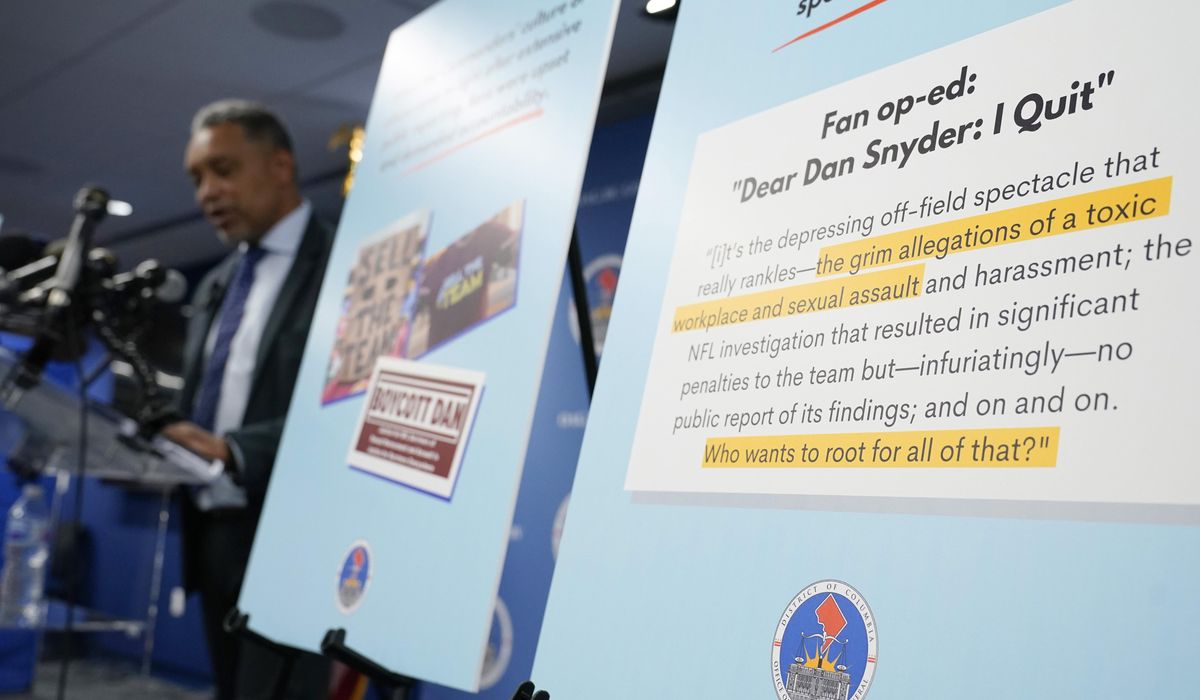
Last week Maryland Attorney General Brian Frosh had this to say about the Washington Commanders:
The Washington Commanders (formerly the Washington Redskins) collected security deposits from season ticket holders and other purchasers of tickets for seats in luxury suites. Under its contracts with ticket holders, the team was required to return the deposits within 30 days after their contracts for seat licenses expired or were terminated. The Commanders did not return the deposits to consumers unless they requested the return in writing. Attorney General Frosh accused the team of violating the Consumer Protection Act when it failed to honor its contracts and return the deposit to consumers.
For many years, the Commanders kept money that was not theirs. It belongs to their customers. Today’s settlement will require the team to return the monies owed to consumers. The Commanders will pay a penalty, and they will be enjoined from engaging in similar practices in the future.’
Forgive me, but isn’t this what former team employee Jason Friedman, a former vice president of sales and customer service who worked for the team for 24 years, told the House Oversight and Reform Committee in April? That the team withheld refundable deposits from its customers?
Doesn’t that, then, validate Friedman’s committee testimony, first reported in the Washington Post and outlined in a letter from the committee to the Federal Trade Commission? After all, there is no Maryland investigation without his testimony.
And if this was the outcome in Maryland, doesn’t it likely mean there will be a similar outcome in the District, where Attorney General Karl Racine filed a suit — the second action he filed following his lawsuit charging the team deceived customers about an investigation into their toxic work environment — making the same allegations about ticket deposits?
And what about Virginia, where Attorney General Jason Miyares is also doing his own investigation into the Friedman allegations? What are the chances the outcome will be any different there?
None of these probes are taking place without Jason Friedman.
And if Friedman’s testimony led to the Maryland punishment against the Commanders, wouldn’t it also lend much more credibility to the other key part of his testimony into the financial misconduct he witnessed firsthand while working for the team — hiding revenue intended to be shared with other NFL owners, all part of the two sets of books that he said the team used to hide this money from everyone?
The Maryland attorney general probably could not care less if Commanders owner Skipper Dan the Sailing Man and his minions were hiding money from other NFL owners, so there was nothing in the settlement about it. And the NFL is not likely to admit that they got taken by a sap like Skipper Dan, so they are not likely going to reveal if this happened. But based on the Friedman testimony resulting in the Commanders agreeing to pay a $250,000 fine — a business that has bounced 50/50 raffle winner checks — to the state of Maryland as part of the settlement, it’s likely that the two sets of books was indeed accurate.
And if what happened in Maryland validates Friedman’s testimony about the financials, doesn’t his other testimony gain more credibility about the sexual misconduct he said he witnessed involving Skipper Dan and former employee Tiffani Johnston, who accused the owner of placing his hand on her inner thigh under a table at a dinner and then later “aggressively” pushed her toward his limousine? The NFL has hired former federal prosecutor Mary Jo White to look into those allegations.
Friedman wrote a letter to the committee backing Johnston’s charges: “I witnessed Dan Snyder grab the arm of my coworker Tiffani Johnston and attempt to pull her into his limousine. This took place over a dinner in Washington, D.C. I was shocked. Thankfully, Tiffani was able to pull away.”
Doesn’t that letter mean more now after the Maryland attorney general told the world that Jason Friedman was right about ticket deposits?
Commanders’ lawyers flexed their muscles when Racine held his press conference about the initial lawsuit charging the workplace coverup, writing that “we welcome this opportunity to defend the organization — for the first time in a court of law and to establish, once and for all, what is fact and what is fiction.”
Apparently, they passed on the opportunity to do so in Maryland, agreeing to the settlement while not actually admitting to any guilt. Their reaction?
“The Washington Commanders have not accepted security deposits for more than 20 years in the case of premium tickets and more than a decade in the case of suites, and we began returning them to season ticket holders as early as 2004,” a team statement said. “In 2014, as part of a comprehensive review, team management was instructed to send notices to more than 1,400 customers with deposits and return all security deposits requested.
“Further, the team engaged an outside law firm and forensic auditors to conduct an extensive review of the Commanders’ accounts and it found no evidence that the team intentionally withheld security deposits that should have been returned to customers or that the team improperly converted any unclaimed deposits to revenue.”
Yet here we are — signing $250,000 checks for penalties and agreeing not to engage in this sort of behavior in the future.
I suspect the Commanders will get their day in court someday, but not the one they want. When Friedman’s comments were first reported, the team issued this statement: “There has been absolutely no withholding of ticket revenue at any time by the Commanders. Those revenues are subject to independent audits by multiple parties. Anyone who offered testimony suggesting a withholding of revenue has committed perjury, plain and simple.”
Perjury? Friedman’s lawyer, Lisa Banks, responded that the Commanders statement “defamed my client, Jason Friedman, who came forward at the request of the Congressional Oversight Committee and testified truthfully, with evidence.”
Based on the Maryland attorney general’s confirmation of Friedman’s allegations, I’d say Skipper Dan and his army of mouthpieces will get their opportunity soon.
You can hear Thom Loverro on The Kevin Sheehan Show podcast.
Correction: An earlier version of this column incorrectly reported Maryland Attorney General Brian Frosh‘s first name.








